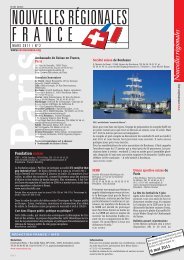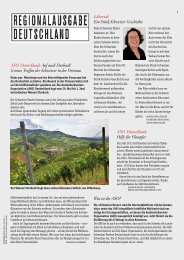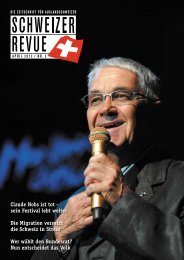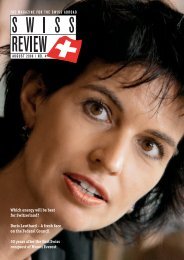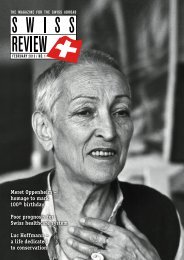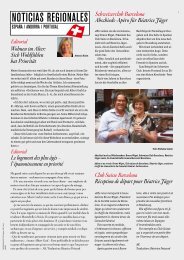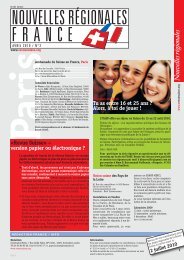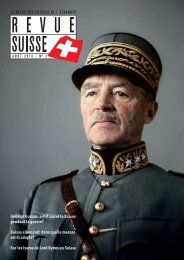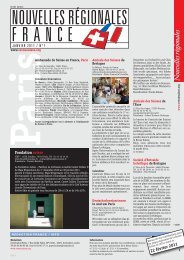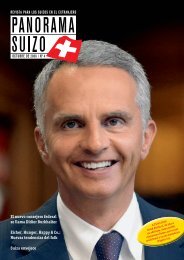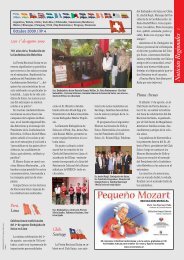Download PDF Swiss Review 3/2013 High ... - Schweizer Revue
Download PDF Swiss Review 3/2013 High ... - Schweizer Revue
Download PDF Swiss Review 3/2013 High ... - Schweizer Revue
You also want an ePaper? Increase the reach of your titles
YUMPU automatically turns print PDFs into web optimized ePapers that Google loves.
12<br />
Politics<br />
The battle over the Olympics<br />
Proponents had promised a highly sustainable Olympic Games. But the dream has ended prematurely – the electorate of<br />
the canton of Grisons has rejected the staging of the 2022 Winter Olympic Games in St. Moritz and Davos. Why has there<br />
been such scepticism in Switzerland towards the Games that are so coveted worldwide?<br />
By Marc Lettau<br />
<strong>Swiss</strong> <strong>Review</strong> June <strong>2013</strong> / No. 3<br />
Photo: Keystone<br />
Who remembers the 2010<br />
Olympic Games in Berne<br />
and Montreux? You will<br />
not recall them because<br />
they never took place. The<br />
Berne-Montreux bid was<br />
prematurely derailed by<br />
the people of Berne. They<br />
did not like the idea of<br />
sacrificing the federal<br />
capital’s very own mountain<br />
– the Gurten – for a<br />
bobsleigh run. So, in 2002,<br />
they overwhelmingly rejected<br />
the prospect of the<br />
Olympic Games right on<br />
their doorstep.<br />
Now there is a sense of dejà-vu. The<br />
Olympic dream came to a premature end at<br />
the beginning of March <strong>2013</strong> in the canton<br />
of Grisons too. In a referendum 53% opposed<br />
the hosting of the 2022 Winter Olympic<br />
Games. Politicians and representatives<br />
of the sporting and business worlds had unsuccessfully<br />
attempted to highlight the benefits<br />
of the Games for the future of Grisons.<br />
And the promoters had promised in vain to<br />
ensure a sustainable Games. People instead<br />
listened to environmental organisations,<br />
which decried the promoters’ pledges as little<br />
more than marketing measures and<br />
warned of “mountainous debt and environmental<br />
damage”.<br />
The no campaign personified<br />
The 60-year-old grammar school teacher<br />
and <strong>Swiss</strong> Social Democratic Party (SP)<br />
politician Silva Semadeni is the personification<br />
of the no campaign. She vehemently<br />
opposed the Olympic promoters. Reflecting<br />
on her reasons, she remarks “the enormous<br />
scale of the Games today” is incompatible<br />
with the protection of the Alps.<br />
She adds: “The Winter Olympic Games<br />
are not sustainable. The waste of energy<br />
and resources and the impact on the natural<br />
environment and landscape are huge.”<br />
This “highly commercialised mega-event”<br />
Silva Semadeni, SP National Councillor and figurehead of the opposition to the<br />
Olympics<br />
was unsuitable for the mountain valleys:<br />
“My focus is on ensuring a gentler and selfdetermined<br />
development of the canton.”<br />
Sochi acts as a deterrent<br />
Through her criticism Semadeni indirectly<br />
suggests that the referendum was not just<br />
decided in Grisons but also in the Russian<br />
city of Sochi. The approaching 2014 Winter<br />
Games in this sub-tropical seaside resort<br />
are generally viewed as grandiose, and<br />
the budget has rocketed from 8 to 44 billion<br />
<strong>Swiss</strong> francs. Semadeni says: “The<br />
Sochi Games with their dreadful incursions<br />
into nature and exorbitant costs serve<br />
as a deterrent to any right-minded person.”<br />
The experiences of previous venues are also<br />
sobering, says Semadeni. They have left in<br />
their wake environmental damage, oversized<br />
infrastructure and mountains of debt<br />
for the public sector. Even sports fans concede<br />
that Sochi has influenced the <strong>Swiss</strong><br />
perception of the Games. “Sochi is the absolute<br />
opposite of the plans organisers had<br />
in mind for the Olympic Games in Grisons,”<br />
says the experienced sports journalist<br />
Thomas Renggli after a visit to Russia. Semadeni<br />
says: “If the Games are ever to take<br />
place in the Alps, the International Olympic<br />
Committee will have to amend its rules<br />
and focus much more heavily on existing<br />
infrastructure.” The Games today are too<br />
much of a “money-making<br />
machine for the IOC”.<br />
Structural obstacles<br />
In Switzerland, the canton<br />
where the proposed venue is<br />
located makes the decision<br />
on an Olympic bid. But the<br />
Games overstretch individual<br />
cantons. After the rejection<br />
by the people of Grisons,<br />
IOC Executive Member<br />
René Fasel therefore proposed<br />
that these enormous<br />
structural hurdles be lowered:<br />
federal government<br />
should firstly set aside three billion <strong>Swiss</strong><br />
francs for the Olympic Games and then ask<br />
who would like to organise them. Fasel believes<br />
that many cantons would apply if this<br />
approach were adopted. But Fasel’s concept<br />
was met with a lack of understanding. The<br />
“Neue Zürcher Zeitung” accused him of failing<br />
to appreciate the principle of democracy:<br />
the proposed billion-franc loan could not just<br />
be conjured up but would also have required<br />
the approval of the <strong>Swiss</strong> people. This means<br />
that the two Winter Olympic Games that<br />
Switzerland hosted in 1928 and 1948 are unlikely<br />
to be added to any time soon.<br />
Marc lettau is an editor with the “<strong>Swiss</strong> <strong>Review</strong>”<br />
Rebuffed<br />
The International Olympic Committee has<br />
its headquarters in Switzerland, in Lausan<br />
ne. However, Switzerland does not receive<br />
preferential treatment when it comes<br />
to the awarding of Olympic Games, as there<br />
is a long list of failed bids. St. Moritz (for<br />
the 1936 and 1960 Games), Lausanne (1936,<br />
1944, 1948, 1952, 1960) and Sion (1976,<br />
2002, 2006) have made unsuccessful bids<br />
for Summer or Winter Games. Alongside<br />
these are the Olympic plans rejected by the<br />
people, such as in Zurich (referendum of<br />
1969), Berne (1969, 2002), Valais (1963),<br />
Vaud (1986) and Grisons (1985, <strong>2013</strong>).



